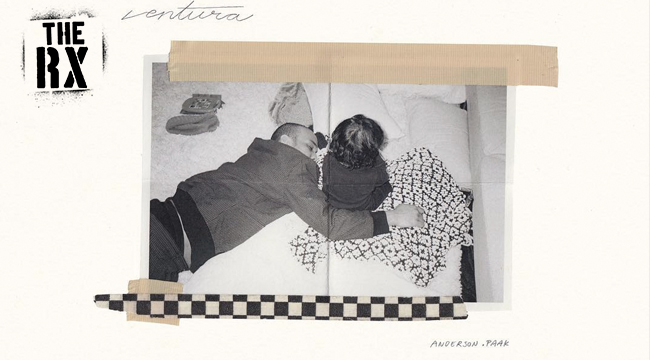
The RX is Uproxx Music’s stamp of approval for the best albums, songs, and music stories throughout the year. Inclusion in this category is the highest distinction we can bestow and signals the most important music being released throughout the year. The RX is the music you need, right now.
If Nipsey Hussle’s death had or is still having a heavy effect on you, you might want to skip the last track on Anderson .Paak’s new album Ventura, “What Can We Do?” which features the late, great Nate Dogg. Hearing Nate again is a gut punch — especially for a west coaster like myself — but especially so soon after the realization that we might be running out of new Nipsey Hussle songs in the near future as well.
On the other hand, what better healing instrument, what better salve for the ache in all our hearts, than the soothing, honey-glow tones of Long Beach’s own original thug crooner? Hearing him again on .Paak’s new album this week might buckle your knees and break your heart all over again, but that voice… that voice is like a warm hug from an old friend. It’s a reminder that although the people we love may be gone from our physical presence, we can always hear them again in the work they left behind.
That timeless, eternal quality permeates Ventura, .Paak’s own latest work, which arrives just about on the heels of his previous album, Oxnard. Recorded in conjunction with the 2018 release, Ventura has both a quality of completeness to it that Oxnard seemingly lacked, as well as a hint of mea culpa behind its sonic cohesion that suggests that Anderson is maybe a little aware that Oxnard wasn’t exactly the project his fans wanted at the time.
And while I’ll maintain that Oxnard was easily one of the best projects of the year, perhaps its eclecticism would have been better received was the year not already cluttered with four or five releases all clamoring for our collective attention in 2018. With so much cacophony within a 12-month span, perhaps Oxnard‘s experimentalism wasn’t as appreciated when all anyone seemingly wanted from any project that year was a consistent theme and a manageable running time. As it was, it may have simply been too daunting at a time when a little simplicity could have gone a long way.
Consider the lesson learned on Ventura, which despite its origin as a sort of collection of throwaways, sounds more like an intentional work of art, with a collective theme, a clear thesis, and a classic, Blaxploitation-inspired sound. Where Oxnard was all about the kitchen sink approach that ironically constrained it, Ventura seems unbound, freer despite its more reserved style, which utilizes a symphony orchestra to lend it the air of a film score, fleshing out the narrative Anderson unfurls here.
Equal parts Curtis Mayfield, Sly, and Snoop Dogg, Ventura makes excellent use of Anderson’s distinctive rasp and its astonishing list of guests, finding him ruminating on more conventional fare than its predecessor, but it’s far more effective in its relative simplicity. From the throwback sounds of its Andre 3000-featuring opener, “Come Home,” Andy shakes off his carefully cultivated cool to get vulnerable in asking a scorned lover back: “I’m beggin’ you, please, come home / No one even begs anymore.” Andre’s guest verse is typically excellent but given the time that’s passed since his previous foray into the spotlight, his dazzling wordplay might blow you away anyway.
.Paak carries the theme of seeking forgiveness into the next song, Ventura‘s second single with a stunning guest appearance from Smokey Robinson, “Make It Better.” “How do you mend when you’re worlds apart?” he wonders. “When you take somebody for your own / It can’t survive on history alone.” However, lest anyone think he’s gone soft, songs like the Jazmine Sullivan-featuring cheaters’ anthem “Good Heels,” remind that he’s still up for a philandering fling, even if it means risking the wrath of a jilted lover.
He even gets political, praising the good works of NBA star LeBron James with “King James” before weaving yet another colorful ode to the beauty of Black women alongside Brandy on “Jet Black.” Producing on all the tracks, mainly alongside collaborators Jairus “J-Mo” Mozee and Pomo with contributions from The Alchemist, Fredwreck, and Pharrell Williams, it seems that Anderson found the key to making his musical experiments work, grounding the more off-the-wall imagery and song concepts in the soulful traditions of yesteryear, which provides a solid foundation for listeners to engage the weirder ideas.
And then there’s that closer, “What Can We Do?” Given full reign of Dr. Dre’s archives, he unearths a gem of a vocal performance from a singer who may very well be his most immediate musical ancestor as a “rap singer, the hook master,” trading lines in the chorus as if the two were in the studio together during the recording process. While ostensibly the song functions as contemplation of his next move after the relationship with his girl comes to its (basically inevitable) end, there’s a meta-commentary hanging over the proceedings.
Nothing and no one we lose is ever really lost. The ancestors are with us, in the traditions that we keep alive, so long as we keep them alive. Love is eternal, it’s something in the universe, like matter or energy, that can’t be destroyed or created, only transformed. Nate Dogg may be gone, but he might also be here again as Anderson .Paak, just like when .Paak is gone, he’ll return as the next evolution of the soulful, rugged rap-soul sound. The same can likey be said of Nipsey. He’s still out there in the universe waiting to come back in his next form. There is so much comfort in that truth, the comfort that we all needed, just when we needed it most… and it’s right on time.
Ventura is out now via Aftermath Entertainment. Get it here.






